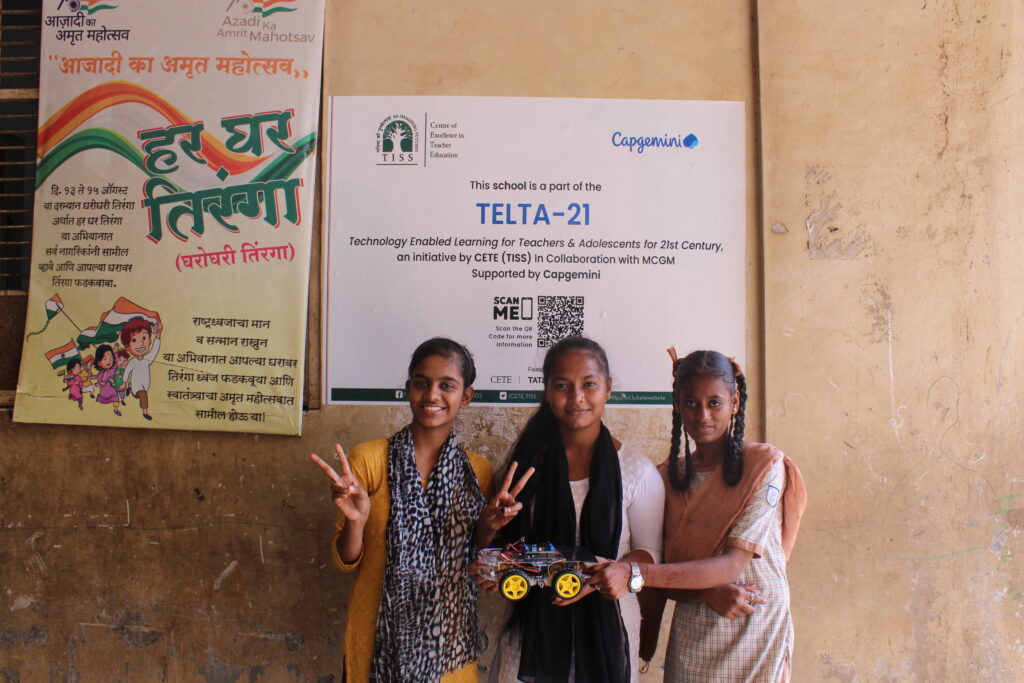News
Students from 28 MCGM Schools in Mumbai showcase technology-based artefacts
In the event, 23 projects were created by 75 secondary school students, on a wide-range of topics
related to secondary school STEM curriculum
On 26 th April, students from 28 MCGM schools from the M-Ward (Chembur, Govandi, and
Tilak Nagar) in Mumbai, showcased STEM-based artefacts related to their curriculum, that
they created using various tech-based resources and programs, at the “TELTA21 Mela”
event. The event was conducted at Shivaji Nagar Municipal School number-2, Govandi
(West). 23 projects were created by 75 secondary school students, on a wide-range of topics
related to secondary school STEM curriculum. The event was organised by the TELTA21
(Technology Enabled Learning for Teachers; Adolescents of the 21st century) project,
which is a collaborative effort by the Centre of Excellence in Teacher Education (CETE) at
the Tata Institute of Social Sciences (TISS), and Capgemini.
Teachers, school principals, and parents of students from schools all over the M-ward
attended the event to witness the presentation of multimedia projects by students on a wide
range of topics such as AQI, BMI, Force and Electricity, Submarines and automobiles,
Gravity etc. which were created using a variety of technological resources. In addition to the
presentations, digital badges and certificates were given to the students and schools who had
successfully participated in the initiative, and had created projects for the event.
The event was inaugurated by Mr. Vijay Jadhav, Administrative Officer M-East-Ward, along
with Mr. Anurag Pratap, Vice President and CSR Leader, Capgemini, and Dr. Amina
Charania, Associate Professor, TISS and Lead of the TELTA-21 Project, Mrs. Asha More,
Deputy Education Officer (PPP-Cell), and Dr. Mythili Ramchand, Co-Chairperson, CETE,
TISS interacted with the students and provided encouragement and feedback regarding the
projects created.
Mrs. Asha More, Deputy Education Officer (PPP-Cell) said, “From my interactions with the
students, it is clear that the initiative has sparked the curiosity of the students, which has led
to them research their topics in detail. I feel this initiative will help students in their further
studies, and will unearth the inner scientist that is hidden inside them.”
Mr. Vijay Jadhav, Administrative Officer, M-East-Ward said, “The projects I saw were
innovative and I was impressed by the community-driven nature of some of the projects. It
was surprising to see students of such young ages present such projects so successfully. All of
us at the BMC Education Dept. are thankful to the TISS for giving an opportunity to students
across the M-Ward to showcase their skills, and hope that we get to see more such projects in
the future.”
The TELTA21 Mela is an annual event that was conceptualized with a view to provide
students across MCGM schools in the M-Ward a platform to showcase their artefacts that
they have worked on throughout the academic year. The event is aimed at creating a common
platform where government officials, teachers, principals, and parents of students can interact
and share ideas, and witness the creative output of the students.
Dr. Amina Charania reflecting on the growth of the event said, “The annual Mela is one of
the most awaited events for the TELTA-21 community, where students showcase their
creative artifacts using digital technologies, situated within the topics from the curriculum,
and their lives. Compared to last year's annual mela, we have seen an increase in students'
confidence, ability to question, reasoning and their agency to create with technology.”

About TELTA21:
The TELTA21 project aims to:
– Provide equitable opportunities to students irrespective of gender and socio-economic status
of the students.
– Enable students to emerge as 21st century learners: producers of ICT resources, who can
undertake authentic and research-based learning with technology and acquire digital agency*
to improve their own life and community wellbeing.
– Prepare teachers to use constructivist teaching-learning with technology (CTLT) in regular
classroom practices, use distance technologies for active collaborative learning to foster
agency and 21st-century skills in adolescents.
– Develop evidence-based implementation maturity-matrix for technology enabled education
for the states to adapt and integrate in their systems at larger scale.
About CETE:
CETE is an independent centre at the Tata Institute of Social Sciences, Mumbai. Established
in 2015, the Centre has been engaging with, and promoting innovation in school curriculum,
teacher education and higher education curriculum and pedagogy. CETE is working towards
revitalising the education sector through research, academic programmes, teaching, field
action, policy advocacy, partnerships and collaborations.
The Centre’s flagship action research programme, the Connected Learning Initiative (CLIx)
(https://clix.tiss.edu), was awarded the UNESCO-King Hamad Prize for the ‘Use of ICTs in
Education’ (2017 edition). CLIx is a collaboration between TISS, MIT and the Tata Trusts.
About TISS:
The Tata Institute of Social Sciences (TISS) was established in 1936 as the Sir Dorabji Tata
Graduate School of Social Work. In 1944, it was renamed as the Tata Institute of Social
Sciences. The year 1964 was an important landmark in the history of the Institute, when it
was declared Deemed to be a University under Section 3 of the University Grants
Commission Act (UGC), 1956. Since its inception, the vision of the TISS has been to be an
institution of excellence in higher education that continually responds to changing social
realities through the development and application of knowledge, towards creating a people-
centred, ecologically sustainable and just society that promotes and protects dignity, equality,
social justice and human rights for all.